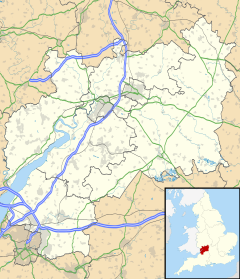Newent, Gloucestershire
| Newent | |
|---|---|
 The Market House, Newent |
|
| Newent shown within Gloucestershire | |
| Population | 5,207 |
| OS grid reference | SO7225 |
| Civil parish |
|
| District | |
| Shire county | |
| Region | |
| Country | England |
| Sovereign state | United Kingdom |
| Post town | NEWENT |
| Postcode district | GL18 |
| Dialling code | 01531 |
| Police | Gloucestershire |
| Fire | Gloucestershire |
| Ambulance | South Western |
| EU Parliament | South West England |
| UK Parliament | |
Newent (originally called "Noent") is a small market town and civil parish about 10.6 miles (17.1 km) north west of Gloucester in Gloucestershire, England. Its population at the 2001 census was 5,073, increasing to 5,207 at the 2011 census. There has been a settlement here since at least Roman times and the town first appeared in the Domesday Book. It was a Medieval market and fair town.
Noent, the original name for Newent, may mean "new place" in Celtic. It also may mean "new inn" to reference lodging for travellers to Wales, according to John Leland (c. 1503 – 1552). According to Leland, there was a house called "New Inn", later named The Boothall, that provided lodging along the road to Wales.
Newent is on the northern edge of the Forest of Dean, and lying within the Forest of Dean District. It is southeast of the River Wye, which was connected to Gloucester in the late 18th century by the Herefordshire and Gloucestershire Canal, which was 34 miles (55 km) long.
A Roman road was constructed between Newent and Ariconium, near what is now Ross-on-Wye. Within 1.3 kilometres (0.81 mi) of Newent, there were several metal working sites used by the Romans. Aside from the metal working sites, evidence of Romano-British settlement was seen within that area and up to 56 sites within 10 kilometres (6.2 mi) of Newent. Archaeological evidence includes old Roman coins and pottery found near Newent, Roman coins and treasure found at Little Gorsley, and a settlement at Dymock.
...
Wikipedia

